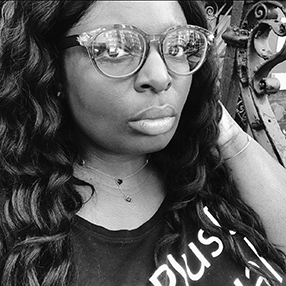Pier 52
—after a photograph by Alvin Baltrop
He looks through the wound of my life like it’s light. So I let him. The last cube of ice. Outside the tray. Where I found him. My lover. Melts atop this brick, as if it’s our last whiskey together. His brown, more fragrant, more dangerous than whiskey. You couldn’t miss him. Nothing lasts. Of promise. Such is the promise of light. Not even day breaks between us. Black joy, cresting over and over the summer sun. Kept a spiral of his hair, in a box, like a favour. His favourite pair of trainers. The taste of his lips where we first kissed. Where we first blissed. I couldn’t— though I tried. To keep him. Wouldn’t keep. Still. Nor true. Keep up. How could he keep me, when he refused to keep time? Didn’t keep me in compliments. Was I supposed to keep sweet? Look. We discovered day like it was fire. Flesh, like empire. Touch like bloodlight. Yes. Count me down like a missile. As of tomorrow and the day after. As of this darkening gelatin and silver. As of the moon and the monsoon rain. As of these piers. As of America and all its splendour. As of the alleyway and the archive. As of this F-stop. And this fuck. And the next. As of this click and shutter. As of the daffodil and every queer thing that obliterates winter.
Copyright © 2021 by Omotara James. Originally published in Poem-a-Day on February 4, 2021, by the Academy of American Poets.
“Alvin Baltrop was a Black, queer photographer who documented gay culture along the Hudson River Piers in the 1970’s and 80’s, during the period between the Stonewall riots and the AIDS epidemic. This poem functions as an ekphrastic response to a photograph by Baltrop, in which two presumably queer, masculine-presenting lovers share a sensual embrace. Whereas the photograph captures a moment in time, this poem expands upon Baltrop’s gaze, to offer a fictional account of the lovers. The subject of Baltrop’s body of work is not merely explicit voyeurism, such as nude sunbathers and sexual encounters, but human intimacy itself. The poem works to mirror this intimacy for the reader, conflating the distance between artist and subject: voyeur and lover, past and present. What is the relationship between the act of love and the archive of it? Baltrop gave his life over to his work, quitting his job as a cab driver, before which time he was a medic in the navy. However, he was not afforded the same opportunities as his white contemporaries, to exhibit his work during his lifetime. Therefore, this poem is also a love letter for and to Baltrop and all the outliers, archivists, artists, queers and anyone who has been in love and then outside of it.”
—Omotara James

